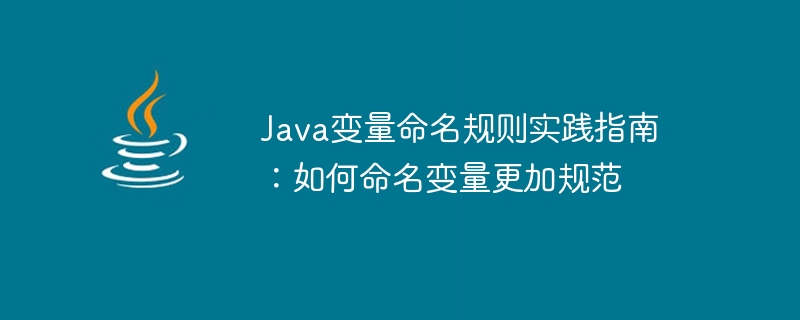Home >Java >javaTutorial >Practical Guide to Java Variable Naming Conventions: Optimizing Variable Naming Methods
Practical Guide to Java Variable Naming Conventions: Optimizing Variable Naming Methods
- WBOYWBOYWBOYWBOYWBOYWBOYWBOYWBOYWBOYWBOYWBOYWBOYWBOriginal
- 2024-01-30 10:38:13776browse

Practice Guide to Java Variable Naming Rules: How to name variables more standardizedly, specific code examples are needed
Summary:
Good variable naming when writing Java code Specifications are key to improving code readability and maintainability. This article will introduce some rules and practical guidelines for Java variable naming, and demonstrate it through specific code examples.
Introduction:
Java is a very popular programming language, loved by many developers for its simplicity and readability. When writing Java programs, variables are a very important part. Good variable naming conventions can greatly improve the quality of the code and reduce the difficulty of debugging and maintenance.
1. Variable naming rules:
- Use meaningful names: Variable names should reflect the role and meaning of the variable. Avoid using single characters or meaningless names. For example, use totalAmount instead of t and customerName instead of c.
- Camel case naming method: Variable names composed of multiple words should use camel case naming method. That is, capitalize the first letter of each word and join the words together. For example, firstName, totalAmount.
- Avoid using special characters: Variable names should only contain letters, numbers, and underscores, and should not contain special characters or spaces.
- Use reasonable length: Variable names should be long enough to express the meaning of the variable, but not so long that they are difficult to read.
2. Naming of variable types:
- Class-level variables: Class-level variables are also called static variables and are defined outside methods within the class. Names should begin with a capital letter and multiple words should be separated by underscores. For example, MAX_ATTEMPTS.
- Instance variables: Instance variables are attributes of the class, and each object of the class has its own instance variable. CamelCase should be used when naming.
- Method-level variables: Method-level variables are variables defined inside the method, and their scope is limited to the inside of the method. CamelCase should be used when naming.
3. Sample code:
public class ExampleClass {
private static final int MAX_ATTEMPTS = 5;
private String customerName;
public void processOrder(String orderId) {
int orderAmount = getOrderAmount(orderId);
for (int i = 0; i < MAX_ATTEMPTS; i++) {
if (i < orderAmount) {
System.out.println("Processing order: " + orderId);
}
}
}
private int getOrderAmount(String orderId) {
// 查询数据库或获取订单金额逻辑
return 10;
}
}In the above sample code, we followed the rules and practice guidelines for variable naming. The static variable MAX_ATTEMPTS uses uppercase letters and underscores, the instance variable customerName uses camel case naming, and the method-level variables orderId and orderAmount also use camel case naming.
Conclusion:
Good variable naming conventions can improve the readability and maintainability of the code. In practice, we should always follow the rules of variable naming and use meaningful names to describe the role and meaning of variables. Standard variable naming can make the code easier to read and maintain, and also help improve the efficiency of team collaboration.
The above is the detailed content of Practical Guide to Java Variable Naming Conventions: Optimizing Variable Naming Methods. For more information, please follow other related articles on the PHP Chinese website!
Related articles
See more- The impact of PHP code testing function on code readability and how to improve it
- Golang development experience summary: several tips to improve code readability
- An effective way to improve code readability: Reasonable application of Python identifiers
- Improve code readability: interpretation of common variable naming rules in Python
- Improve Java code readability and optimize variable naming conventions

